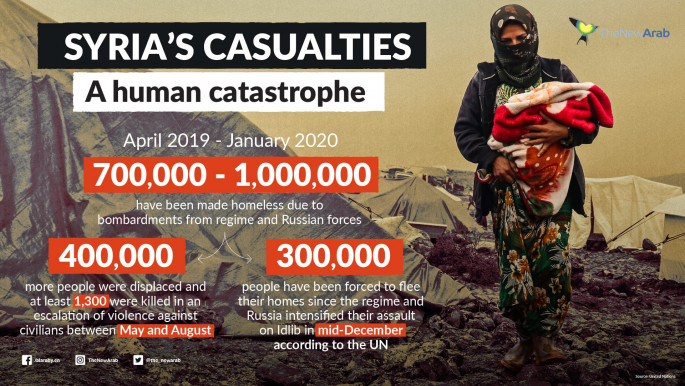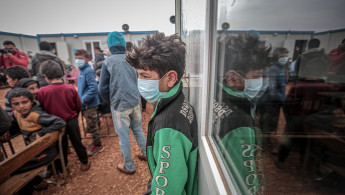Agencies contributed to this report.
Follow us on Facebook, Twitter and Instagram to stay connected
Vital aid deliveries to northeastern Syria dealt another heavy blow amid Russian pressure
United Nations agencies delivering vital aid in war-torn Syria have been dealt another blow under the pressure of Syrian regime ally Russia.
UN relief agencies have been instructed to stop funding the work of private charities transporting medical equipment from Iraq into northeastern Syria, Foreign Policy reported, which will hit the region particularly hard as it attempts to stave off a devastating coronavirus outbreak.
The United Nations informed the agencies a number of weeks ago that they could fund private charities working in opposition-controlled northeastern Syria as long as they were registered with the Syrian government in Damascus, Foreign Policy revealed.
This blow to funding comes amid concerns from the World Health Organisation (WHO) and aid agencies that coronavirus will have a "catastrophic impact" on the region's 2 million inhabitants.
The UN Security Council had already in January, under pressure from Russia, drastically scaled back the cross border aid to Syria that has been instrumental in the war-ravaged country since 2014. This included shutting down the key border crossing of Yaroubia on the Iraqi-Syrian border.
Following the January vote, UN humanitarian chief Mark Lowcock asked the UN Office of Legal Affairs (OLA) to advise on whether continuing cross border aid deliveries into northeastern Syria would be legal, four diplomatic and relief sources told Foreign Policy.
OLA then concluded that the UN could only fund agencies approved by the Syrian regime, at which point UN officials advised aid groups that funding would be stopped.
The WHO warned the UN Security Council last week that "New options are needed to fill the significant gaps and to continue the humanitarian assistance previously delivered through Ya'rubiyah,” Foreign Policy learned in a confidential memo.
"The urgency to respond is not only to control transmission in NES [northeastern Syria], but also to limit the spread of other areas of Syria that have not yet been affected."
|
Members of the United State Congress are also urging President Donald Trump to block Russia's efforts to hamper aid efforts, Foreign Policy reported.
"The closure of the Ya'rubiyah border crossing between Iraq and northeast Syria has hindered the overall humanitarian response and disrupted the UN's ability to deliver specialised medical equipment," the chairs and ranking members of the Senate Foreign Relations Committee wrote Tuesday in a letter to US Secretary of State Mike Pompeo.
"Without access to these border crossings, the UN has been forced to suspend funding for many of its NGO partners, who must now rely on alternative, woefully inadequate, and easily manipulated means to deliver aid, such as land-based convoys from Damascus."
"The Government of Syria is doing its utmost to fight the spread of COVID-19 despite cruel unilateral sanctions. We strongly urge our colleagues not to waste their time on looking for a way to advocate, explicitly or implicitly for getting Al-Yarubiah back and saying that this be the 'only solution'," he told the Security Council in late April.
The relief coordinator's chief spokesperson Zoe Pakston told Foreign Policy that the UN Office for the Coordination of Humanitarian Affairs did not share official guidance from OLA that UN agencies could only provide funding to regime-approved NGOs.
"Similarly, OCHA did not seek, receive or share official OLA guidance that UN agencies could not fund NGOs that provide cross-border assistance," Paxton added.
"The United Nations continues to do everything possible to get help to people in need in northeast Syria, including by advocating for expedited and unhindered cross-line humanitarian access," she said.
Yaroubia closure
The United Nations Security Council agreed in January to prolong aid for six months, with deliveries being made from only from two points along Syria's border with Turkey.
Until then the aid had been extended yearly and deliveries were made from four points along the border - including Yaroubia.
Germany, Belgium and Kuwait, backed by the US, Britain, France and other council nations initially wanted to add a new crossing point and extend the mandate for a year.
But Russia's UN Ambassador Vassily Nebenzia said last month that cross-border aid was meant to be a temporary response to the eight-year Syrian conflict and the situation on the ground has changed.
He said the Jordan crossing point hasn't been used "for a lengthy period of time" and the volume through the Iraqi crossing "is insignificant ... and could be done from Syria" so only the Turkish crossing points are needed.
The Western nations and others insisted, however, that the Iraqi crossing point was also critical, especially for the delivery of medicine and surgical supplies to the northeast.
Russia joined the war in 2015 when the Syrian military appeared close to collapse. Since then, and mainly because of Russia's blanket air support, the Syrian regime has retaken control of most of the country from rebel fighters.
The Syrian regime has only officially recorded 48 cases of Covid-19 and 3 deaths while the Kurdish administration in north-eastern Syria has confirmed one fatality, with two further infections.
Read more: Amnesty accuses Damascus, Moscow of 'war crimes' in Idlib
UN humanitarian chief Mark Lowcock told the UN Security Council in April that while the number may sound low compared to other countries, testing in Syria is very limited.
With millions of people displaced in crowded conditions and without adequate sanitation, he said Syria cannot be expected "to cope with a crisis that is challenging even the wealthiest nations."
Syria's war has killed more than 380,000 people and displaced millions since it started in 2011 with the brutal repression of anti-government protests.
 |





 Follow the Middle East's top stories in English at The New Arab on Google News
Follow the Middle East's top stories in English at The New Arab on Google News


